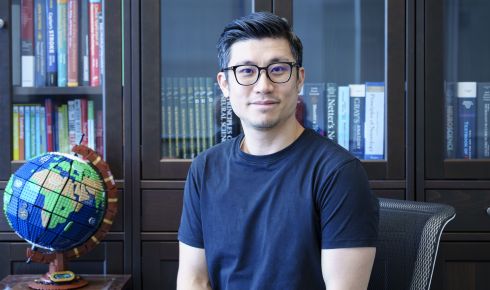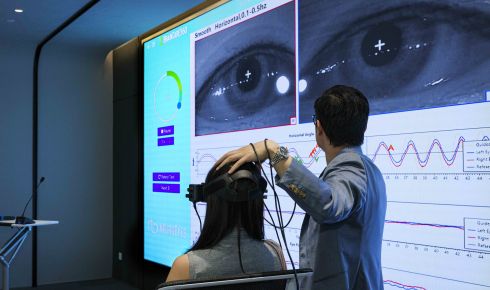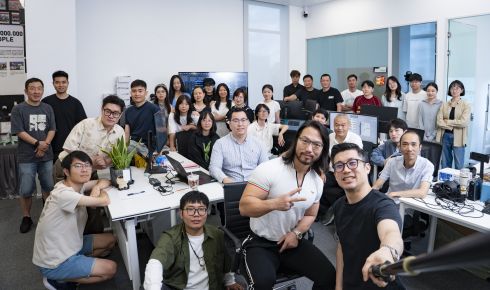My Lab Unlocked: Professor Andy Hsu FRSB, CEO of the BrainCare360 Neurotechnology Lab

Professor Andy Hsu FRSB on his work leading the development of AI-powered brain mapping and neuro-assessment tools
At BrainCare360 Neurotechnology Lab, we’re guided by a simple but powerful question: What’s really happening in the brain behind every symptom we see in the body? Our mission is to make neuroscience visible and accessible – not just to scientists and doctors, but to anyone it can help. We believe it should be practical, usable, and deeply human.
We build non-invasive, AI-powered tools that translate complex brain-body signals into clear clinical insights. From pain and cognition to movement and autonomic function, our technologies help people act on what the brain is telling us right now. Whether through eye-tracking diagnostics, postural analytics, facial recognition, or our flagship pain protocol.
The biggest challenge in the field at the moment is accessibility. Neuroscience remains dense, jargon-heavy, and siloed. Yet if we want it to transform care, we must make it simple enough for anyone to understand and apply. It starts with capturing brain function data in real time, at a level of detail that can truly guide treatment. Structural imaging shows anatomy, but functional brain dynamics – those moment-to-moment changes – are much harder to measure. The deeper challenge is translation: turning raw neurodata into meaningful, usable insights. Not static charts or academic models—but a living, real-time dialogue between brain and body.
 BrainCare360 has developed AI-powered tools to translate complex brain-body signals
BrainCare360 has developed AI-powered tools to translate complex brain-body signals
Our lab sits at the intersection of neuroscience, engineering, and clinical education. We’re international, collaborative, and always build from the user backward – not the patent forward. We design, develop, and field-test our own clinical technologies in close partnership with healthcare and industry collaborators. Rather than stopping at prototypes or publications, we implement our tools directly – now in use across over 700 clinics – to collect real-world feedback to drive continuous improvement.
We’ve also trained more than 20,000 healthcare professionals to use these tools effectively. This tight loop between development, deployment, and frontline feedback ensures our innovations stay relevant.
Each day, we develop and validate digital neuro-assessment tools and clinical protocols. This includes collecting high-resolution eye-tracking data, analysing cognitive load patterns, and running posturography trials with our force plate system. Our engineers work alongside neuroscientists and clinicians to model brain-body interactions using AI. Meanwhile, our education team ensures outputs are teachable and clinician-ready.
Currently, we’re building an AI-powered facial analysis system, matching features such as asymmetry, eye position, and head tilt with our 500,000-record cognitive dataset. The goal is early detection of neurodegeneration, stroke, and other dysfunctions.
Most pain management techniques – whether conservative or surgical — consistently fall short in treating chronic pain. Patients were often told to “wait and see,” while living with symptoms that standard diagnostics couldn’t fully explain or resolve. This prompted us to focus on the neurobiology of chronic pain, especially the role of C-fibres – slow-conducting nerve fibres responsible for transmitting long-lasting pain. In 2016, our team decoded their neurochemical and physiological signatures, laying the foundation for what would become our widely-taught intervention: the Neuro-Reset method.
After years of iterative testing and clinical validation, we commercialised our first neurochemical product targeting chronic pain in 2022. That milestone became a launchpad – allowing us to expand into real-time neuro-assessment, cognitive profiling, movement analysis, and brain-body synchrony. These advances gave rise to the Zen Series technologies: a growing suite of intuitive, clinician-ready tools that make cutting-edge neuroscience both practical and actionable.
I’ve had a few pivots during my career. I began my journey with a biomedical science degree at Monash University, followed by chiropractic degrees at RMIT University. My curiosity about the brain led me into neuroscience, culminating in a master’s in medicine (clinical neurophysiology) at the University of Sydney. To stay ahead of innovation, I’m now pursuing a master’s in data analytics and AI at the University of Queensland.
Throughout my career, I’ve navigated between traditional clinical care and emerging science. This dual perspective eventually led me to step away from full-time practice and build scalable systems that could help more people than I could treat one-on-one. This pivot – from clinician to translational neuroscientist – reshaped my work. I realised my greatest impact lies in building platforms that empower others to deliver better care. Today, I teach at multiple universities and international symposiums, mentor interdisciplinary fellows, and contribute to public science communication—because technology alone isn’t enough. People need context, trust, and training to make change real.
 The team at BrainCare360 is working to advance brain diagnostics
The team at BrainCare360 is working to advance brain diagnostics
My advice to early-career researchers is don’t be afraid to step sideways before moving forward. Many of my biggest leaps – from leaving private practice to experimenting with AI diagnostics – felt risky, but each added momentum and clarity. Above all: build bridges. Between disciplines. Between countries. Between theory and practice. That’s where breakthroughs happen. My lab is always open to collaboration, especially with teams at the crossroads of neuroscience, computing, education, and clinical care. Whether your focus is neuro-AI, sensory rehab, or bio-design, we’d love to connect.
I’m deeply grateful to the hundreds of clinicians who’ve helped refine our tools in real-world settings, and to our academic collaborators past and present – including but not limited to Prof Hai-Wei Huang (Sun Yat-sen University First Affiliated Hospital), Prof Chunna Lan (2nd Xiangya Hospital, Central South University), the National Sports Institute of Malaysia (ISN), International Medical University Malaysia, and institutions across ASEAN and Europe.
Professor Andy Hsu FRSB is the CEO and co-founder of BrainCare360 Technology, a company advancing brain diagnostics and human performance through neuroscience, artificial intelligence and biomedical engineering


